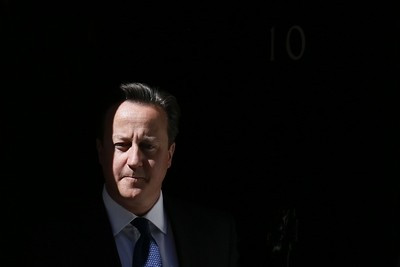Cameron: No Tax Cuts for Squeezed Middle in Autumn Statement

The full extent of Chancellor George Osborne's task in delivering an upbeat autumn statement has been underlined by the prime minister with suggestions that tax cuts will have to wait for another five years.
In remarks that risked angering many on his own backbenches, David Cameron has declared that the government's top priority remained reducing the deficit and that there could be no relief for the so-called squeezed middle income earners until it was "dealt with".
Under current forecasts the deficit will not be eliminated until 2018 at the earliest.
His message came as Osborne finalised his annual statement, which is being looked to by Tories as a pivotal occasion that should lift their flagging spirits in the wake of Labour advances over the cost of living crisis and put them on course for an election victory in 2015.
The statement will be surrounded by a series of good news announcements and many of the measures have already been well trailed, suggesting that Osborne may have a morale-boosting rabbit to pull out of his hat to grab the headlines.
Growth forecasts will be revised upwards, jobs figures will be upbeat, tax breaks for married couples will be confirmed, rates for small businesses are set to be frozen and the promised £50 cut in rises in energy bills will be trumpeted.
It is also likely that Osborne will attempt to outflank his Liberal Democrat allies by announcing an increase in the tax threshold to £10,500, or even higher, by the time of the next election which will help many on the lowest incomes. That is already a LibDem ambition but Osborne wants to take the credit for it.
But the decision not to change the 40% tax rate which hits millions of middle income families will disappoint and anger many Tories, led by the Free Enterprise Group who have been piling on the pressure for tax cuts for months.
And it backs up the repeated message from Cameron and Osborne that the job is far from finished and there are still years of austerity ahead.
Speaking during his trade mission to China, Cameron said: "I'm a low-tax Tory, I believe in allowing people to keep more of their own money to spend as they choose; that's a very important part of my political views, always has been and always will be."
But he added: "I'm also a fiscal conservative. I believe the first duty of government is to safeguard our economy, and the economy isn't safeguarded properly until you deal with your deficit. The job of reducing the deficit and getting Britain back in the black is in no way done."
There were some attempts to lift the gloom on the eve of the statement with ministers announcing a switch in energy subsidies away from onshore wind power and solar generation, which have met with fierce opposition from many rural Tories, towards offshore wind power.
At the same time, ministers re-announced a major £375bn infrastructure programme over the next 20 years including the creation of new nuclear power stations and public-private investments in water, roads and communications.
There is no new money available, but ministers claim the involvement of the private sector through promised investment by big insurance companies is a sign of confidence in the UK economy.
The government also announced the possible sell-off of remaining assets such as the government's stake in the Eurostar rail service which, along with proceeds from Royal Mail privatisation, will all help boost the Treasury's income.
But the big political challenges for Osborne remain, and they are how to lift the morale of his own troops, give the voters the glimpse of some light and the end of the tunnel and convince them to stick with the Tories for fear of Labour ruining it.
He needs to move the political agenda off Labour's chosen territory of the cost of living crisis, embodied in policies such as the pledged energy price freeze, and back onto the growing recovery and good economic forecasts.
An he has to do all this while, at the same time, suggesting austerity is here to stay for years to come.
© Copyright IBTimes 2025. All rights reserved.





















